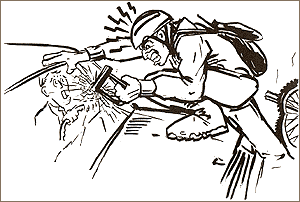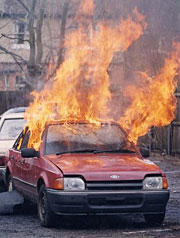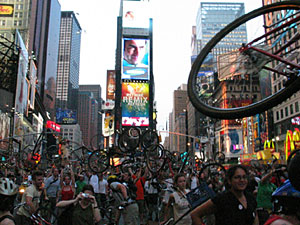Get Cycling, or how not to become tomato paste

The chances are you live and work in a city. It’s also likely that your flat/house/mansion and your office/school/pub aren’t neatly connected by public transport. This is only one reason why you should cycle around town, and there are infinitely many others. Like free drugs! About half an hour after you get into work you get a lovely warm endorphin glow from your body’s own opiates to make your morning go so much smoother. And unlike “exercise,” cycling is fun.
So there’s no question you should do it if you can. It might all seem a bit scary though. More than once I’ve heard “yeah but the traffic, I couldn’t do that.” Yes you can do that, you can get around town quickly, safely and happily, and I’m going to tell you how in my 3 step programme to make your life better.
1 – Know Your Enemy
This is easy to remember and the only absolute rule in this article:
Two Wheels Good, Four Wheels Bad.
 You might know people who drive, they might be nice people. You might even drive yourself. Doesn’t matter. Anyone behind the wheel of a car cannot hear, has narrowed vision and is convinced that their pestilent mode of transport makes them worthy of respect. Billions are spent telling them they’re the only important thing on the road. This 4×4 says that although I look like a boring middle class housewife, I’m “still a bit rebellious”. This luxury car is so far ahead of everyone else in the world, it’s like they’re trapped in slow motion. This little car is FUN, all my other pleasures are secondary to making futile journeys in it. This sports car makes me young and active, my buttocks firm and my skin tones as I sit here flexing my ankles. My car takes me to exotic places along beautifully empty roads. Drivers might not consciously believe this crap but you wouldn’t believe it from the way they act. Don’t play the game. Fear them and their ability to inflict instant death, but don’t ever respect them. They’re trapped in a metal coffin breathing their own fumes getting fat in delusions of freedom and virility.
You might know people who drive, they might be nice people. You might even drive yourself. Doesn’t matter. Anyone behind the wheel of a car cannot hear, has narrowed vision and is convinced that their pestilent mode of transport makes them worthy of respect. Billions are spent telling them they’re the only important thing on the road. This 4×4 says that although I look like a boring middle class housewife, I’m “still a bit rebellious”. This luxury car is so far ahead of everyone else in the world, it’s like they’re trapped in slow motion. This little car is FUN, all my other pleasures are secondary to making futile journeys in it. This sports car makes me young and active, my buttocks firm and my skin tones as I sit here flexing my ankles. My car takes me to exotic places along beautifully empty roads. Drivers might not consciously believe this crap but you wouldn’t believe it from the way they act. Don’t play the game. Fear them and their ability to inflict instant death, but don’t ever respect them. They’re trapped in a metal coffin breathing their own fumes getting fat in delusions of freedom and virility.
Almost all of the problems you’ll encounter cycling around town will be either caused by or exacerbated by CARS. They’ll gas you, block your lanes, ignore you, expect you to give way, knock you over and then bill you for damaging their back windscreen with your knee. They’ll complain when you’re too slow at a junction and call you a bawbag when you skip through the lights. Don’t let them get you down. Like the man said, they hate us because we’re free.
You can’t expect drivers to look after you so the single most important thing you can do on a bike is never to trust them. Ride like they haven’t seen you and would try to kill you if they had: expect doors to open onto you, buses to pull out in front of you, taxis to ignore your hand signals and sports cars to think they can overtake in front of you on corners. You won’t get unpleasant surprises that way.
It’s worth knowing that the majority of “accidents” involving regular cyclists happen in their first few weeks of riding. After that you have the experience to avoid most of the problems thrown at you. In my first eight weeks of cycle commuting I was doored and had two or three falls but since then I’ve had no problems. Once you know what sort of idiocy to expect from motor vehicles (reluctantly) sharing the road, cycling is safer. That isn’t an argument to not start cycling, it’s a reason to be actively paranoid at first until looking ahead and anticipating the conditions becomes automatic.
2 – Know Your Bike
If that all sounds a bit daunting, take heart. You’re in control. You’re no longer relying on a bus to arrive on time, traffic to be mild, parking to be found. You get yourself to your destination at your own pace under your own strength, relying on your new best friend your bike. Of course, you need a bike to be in control of…
What do you need? You can get one good for going round town for less than £100. Take care of it and it’ll last longer than a car would. Make sure it fits you: stand over the frame with feet flat on the floor and make sure that the seat’s at a height such that your leg is fully extended at the bottom of the pedals’ circuit. This gets you the full power of your legs without damaging your knees. Check that the brakes work and the levers don’t touch the handlebars before the blocks touch the wheels. Gears are vital if you’re just starting to cycle and aren’t as fit as you will be later. (Single speed bikes are for cultists and Luddites.) Mudguards are good, I remember this every time I wipe mud off my glasses. Suspension you don’t need in town, no matter how bad the roads are. Learning to avoid the potholes and shift your weight to deal with them makes you a better cyclist, plus it’ll reduce the stress on the frame and make it last longer. Another reason not to have suspension is that you lose energy to the springs, making you look like a tired clown escaping the circus.
That’s pretty much it, simple and beautiful, but remember that the most important part of the bike is you. You are engine, petrol tank and driver all in one. You can keep yourself running smoothly by remembering to eat before you go on a long ride and keeping yourself lubricated (with water not beer). Finding that there’s nothing in your legs to get you home after a long day at work is no fun and if you’re not enjoying riding your bike then you’re missing the point.
You also should really wear a helmet. It’s true that they “may not protect against all conceivable impacts” (and look crap) but you only get one head and it’s not usually worth risking breaking it. But who am I, your mother? I can give you more practical advice than that.

3 – Know How To Ride
There’s a lot of little things that make a big difference to your cycling. Some are obvious, some I didn’t know till someone told me. In no particular order.
Stick Your Arse Out
Nice new bike, lovely tight brakes that stop you dead? Excellent, except they only stop the bike, don’t they? Going over the handlebars is the most spectacular thing you can do on a bike but it’s funnier if it isn’t you doing it. The way to avoid it is to keep your weight at the back of the bike so your body decelerates before it gets too far forward. You can make it part of your braking action: stand a little and push your butt back as you pull on the brakes. Putting your weight back is also good for going downhill without using brakes as it makes you a bit more stable. (I learned this from mountain biking but it’s handy for rain-slicked cobbled streets too.)
Shift Down
When you see an obstacle ahead, try to shift to an easier gear before you reach it. The way your gears work, changes only take effect when you’re pedalling forwards. Shifting when you are stopped or slowing only makes things harder because – clunk! – the gears slip down, you lose balance briefly and probably swerve. Get this right at junctions and when you pull away you get a great moment of acceleration faster than any boy racer next to you.
Signal – See – Slide Over
Hand signals, very important. Drivers being stupid, you need to give them as much chance as possible to see you when you are changing position. To take right turns as an example: signal well before, look over your shoulder to check that no-one’s piling past regardless, then move over to the right of the lane before making the turn or halting (in a low gear, of course). If you slow meekly to a stop and then try to cross the lane in a gap in the traffic, it is a lot harder to get to where you need to be. Don’t be shy: when you signal you are not asking the traffic behind, you are telling it, (signalling your intentions). Give the boxes plenty of time to see you and check they aren’t ignoring you but do move in good time: they’ll only get pissed off and do something stupid if you don’t.
Be In The Right Place
OK, now I’m being patronising but being in the wrong lane is easy done and guaranteed trouble, often because of bad signposting. Example: two lanes going left and I wanted to go straight ahead (bridge at the bottom of Jamaica Street, since you ask) having followed the bike lane on the inside left. With no advanced stop lane, when the lights changed I was stuck trying to cross the second lane. Stupid and unpleasant and unnecessary (and as a helpful policeman pointed out, I could have got myself killed doing that). There’s no trick to this, actually. Know the roads and watch for signs way in advance, especially when you’re following lane markings covered by the boxes.
Smile, Laugh and Sing
This is mostly a propaganda thing but it also shortens your journey and in the long run will make the roads safer (trust me!). Drivers like to think that anyone not in a car wants to be in one and sometimes shout over to you for reassurance that it’s cold outside and that you’re having a miserable time. This is to justify their selfish laziness and must be discouraged. The more folk get out of their cars the safer the roads will be. So don’t fret about splashes and downpours, enjoy the sensual pleasure of water trickling down your face. When you’re weaving through trapped cars make it obvious that you are going to be home before them and you are enjoying the journey a lot more than they are.
Mind The Doors!
Just because a car isn’t moving it doesn’t mean it isn’t going to try and injure you in some way. Expect a door to open on you and you won’t be surprised. Most folk don’t look properly when they get out their box and car doors are both metal and sharp. Give them a wide berth if you can, watch for people inside and make yourself as visible as you can using your old early 90s warehouse rave gear (up to and including glowsticks). If a door does open onto you and you can’t stop you can either go into the car or try and dodge around it. Not a great choice. Ideally you dodge round but not if you’re on a narrow road with oncoming vehicles. Then, coun ter-intuitive as it is, your best option is to hit your brakes and the stationary car. Make a lot of noise so you don’t hit the idiot who didn’t look (even though they’d deserve it), let the bike take most of the impact (even though it doesn’t) and most importantly, get the insurance details of the car you hit. This situation is clear-cut their fault and it’ll cost a lot of money to straighten your forks and front wheel. Tap them for a new helmet and paint job as well: the more it costs the less likely they are to do it again.
Don’t Take Risks (You Don’t Want To Take)
Skipping through red lights. Weaving through rush-hour traffic. Cycling on the pavement. The Highway Code will tell you one thing and common sense will tell you another. If you want to break the rules, do so. It’s only your arse you’re risking on a bike. Be sensible though. The reason couriers get away with the stuff they do is that they are good cyclists. If you are good you can do similar things without getting pasted but if you don’t feel confident about any given situation, give stopping the benefit of the doubt. (For your Mam’s sake, if no-one else.) If you do go onto the pavement, be nice to the pedestrians, they are the cyclist’s natural ally and it’s really tedious to read those newspaper letters that seem to think that bikes are more dangerous than cars. (Fucking drivers, they’re everywhere.)
Disclaimer
I didn’t consult anyone except me about this article and I’m not claiming it’s absolute truth and driver-proof. What works for me might not work for you. Have fun, find out where I’ve been talking mince and don’t blame me for accidents: it’ll be the chumps in the cages.
More information:
– Well-stocked bike shop, runs maintenance courses
– V. readable bike maintenance book, article about getting a 2nd hand bike
– Critical Mass: You are the traffic
– Glasgow cycle campaign group
– One of 1000s of mountain biking sites
– Sustrans: charity building the National Cycle Network